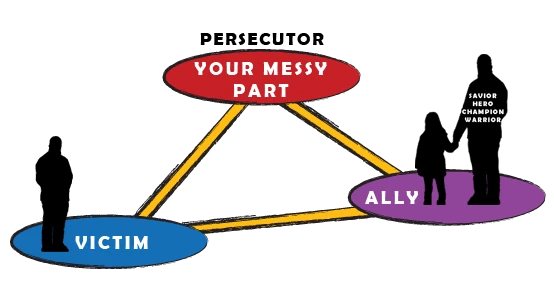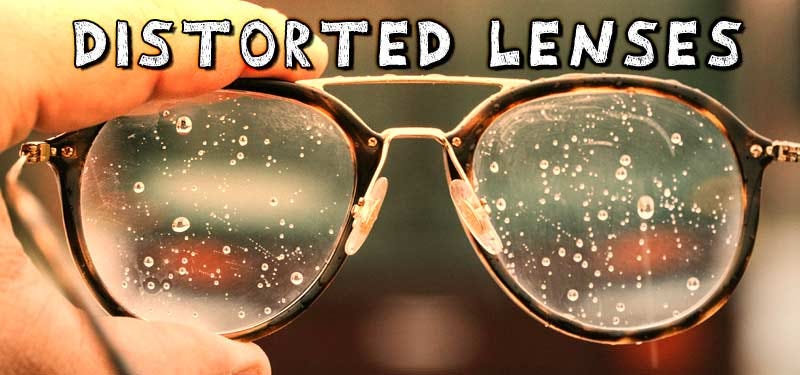Shame: The Internal Drama Triangle
When you view your shameful part as a "persecutor"
When we first enter this world, we are reliant on our social group. We view any kind of rupture as an existential threat. If someone tells you something is wrong with you, your first reaction is to want to fix it because if you don’t, you might lose that source of social support. The fears that come up are based on survival fears we naturally have. To a child being socially rejected feels like a life-or-death situation. It will bring up the fight, flight, fear, or fawn response.
If someone rejects a part of us, in order to feel powerful again, we reject that same part. Shame is a fawn response. It is a triangulation with that “bad” part in order to ally with someone else. So, if a father complains about his daughter’s messy room when he comes home from work, the girl can view the part of herself that is “messy” with shame. In order to feel better she may reject that part of herself. She can start to view the “messy” part of herself as a “persecutor.” She may then align with her father as an ally who agrees with him that being messy is a bad thing.
The daughter may view her father as both a “victim” and a “savior” at the same time. He could be trying to save her from her bad habits that would make her not fit into the world. And she can view her father as a “victim” who has to put up with her “messiness” (“persecutor”). She would then reject that messiness with the same hate she would feel for another person that she viewed as a “persecutor.” But this time it’s all internal.
This fragmentation is likely the beginning of the drama triangle dynamics showing up in a person’s life. As she begins to hate this part of herself, she will judge it harshly and may end up judging others who are messy as well. The reason she would “hate” them, is because she’s still caught up in rejecting this part of herself.
I just read this article today and it’s a good example of how a parent can get their child to see a part of themselves as a “bad” thing. The hippie mother shames the daughter for her modesty. Anna Runkle writes about how she bulldozed that “modest” part of herself. She calls it overriding. Many of us have done a lot of that to “fit in” (or ally with so-called “friends”).
If you view a part of yourself as a “persecutor” (which is splitting, turning it into “all evil”), then anything goes. You feel as if you have a right to attack and ignore its concerns. You’ll notice how people rejoice in the death of others and cry when people don’t get assassinated, so long as that person is recognized as a “persecutor” devoid of humanity. Anything goes. So we get into these internal fights with fragments of ourselves.
Feeling Ashamed?
Are you feeling ashamed about a part of yourself? Have you bulldozed over it? Have you berated that part of yourself in a way you would never talk to another human? I have. Most of us have been playing these drama triangle games with ourselves our whole lives.
What Can You Do?
Our shame came to us when we aligned with another person who had a problem with a part of us. Ask yourself if that person was right. A lot of times we take what other people say as the gospel truth, but there are liars out there. And there are people under the influence who do not see objective reality. They may think they’re telling the truth, but they’re not seeing reality. So we get a warped idea of ourselves when we try to take their perspective as our own. If they were wrong to begin with, it’s time to stop seeing the world through their distorted glasses.
What If They Were Right?
What if you were a messy child? You can ask yourself why were you that thing (that you feel shameful about). So, “Why was I messy?” Maybe the reason is because your parents bought too many toys in an effort to “take care of you” without actually taking care of you. Maybe your parents didn’t have places to put all the things. Was it all your fault? Or were they attempting to shift their responsibility onto you?
Sometimes you have to look back as an adult and realize that people were expecting too much from a child because they didn’t want to or couldn’t meet your needs. Once you realize this, you can give yourself grace. You can attempt to stop viewing that part of yourself as an all-evil “persecutor” and see the shades of grey. Also, stop bulldozing yourself. You’ll want to attempt to appreciate that you were trying to love yourself the best way you knew how (by allying with someone to stay in your social circle or family).
As you start to see your shameful part outside of the drama triangle (no longer a “persecutor” to be hated, attacked, or bulldozed), you may experience rejection from your peers. As an adult, you can understand that social ostracization is not as life-threatening as you felt as a child. If you lose friends, you can gain others who are more suited to who you really are when you love yourself.
Why Would You Be Rejected By Your Peers?
I mentioned that when we’re younger we start hating this “shameful” part of ourselves, and we then become more judgemental about it. If you have built a social circle around hating people who are the thing you’re ashamed about, and you start to accept that part of yourself and integrate it emotionally and mentally, then you won’t have that common ground with those critical peers of yours.
But, my whole Substack is about getting out of the Drama Triangle, and I hope you can see how less stressful it can be to not be hanging around with people who are that judgemental viewing others as “persecutors” all the time.
Have you ever considered shame through the Drama Triangle lens before? Does this make sense to you? I’d love to hear your thoughts on this!
BTC Donation Address: bc1q4s6h8rhyqawqlz46ppc3zc5v43duycp8m57h9p






This is an interesting take on shame. I had never considered it as part of the drama triangle at all. Although I am new to the whole thing even for external, objective events. That said, it is a powerful way to view our world. The endless supply of self-appointed saviours is testament to that, from minorities to climate, there is a lot to "save."
I had always thought of shame as just damage from inappropriate levels of criticism aimed at someone, usually in childhood. For shame to take hold and be useful to an abuser the subject would need to be sensitive enough.
But I had never thought of it as the target being an active participant in the process. I really thought of shame as a wound made by others.